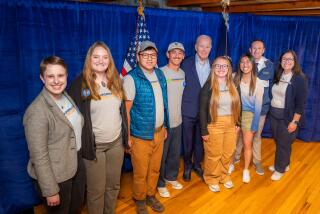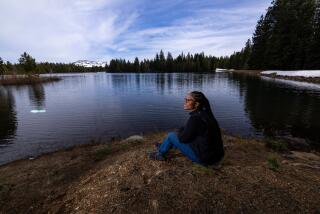This loose cannon was frequently fired
QUICK NOW, NAME the brilliant, abrasive, now-deceased leader who built the Appalachian Mountain Club into this nation’s most powerful environmental group and then was banished by it.
Congratulations: Head-scratching is the correct response.
The Appalachian Mountain Club, founded in 1876 and based in Boston, is a fine group. In fact, it’s the oldest conservation and recreation organization in the country, with 90,000 members, 1,500 miles of trail in its care and a network of northeastern lodges, huts, camps and shelters. But in a gang fight -- which, by the way, I would pay plenty to watch -- the Sierra Club and its 700,000-plus members would kick the AMC up one side of Mt. Katahdin and down the other. And the late David Brower is the reason why.
Brower -- hiker, climber, visionary, propagandist, loose cannon and utterly unknown quantity to millions of tree-huggers under 30 -- is the subject of a new documentary that will screen this week and next at the Los Angeles Film Festival. He is the man who took over the Sierra Club’s executive director job in 1952, when the club was a collection of a few thousand hiking hobbyists. Over the next 17 years he built it into a 77,000-member political powerhouse. Unfortunately -- or so it seemed in 1969, when he was forced out of his job -- Brower got too headstrong to obey the board. He died in 2000 at 88.
For plenty of people, the documentary, “Monumental: David Brower’s Fight for Wild America,” may serve as primer. For me, it was a nudge to rethink his legacy.
Under Brower’s watch, the club rebuffed a federal proposal to dam the Grand Canyon, joined with the Wilderness Society to successfully back the Wilderness Act of 1964 and pushed to dramatically expand the national park system. To Brower’s enduring regret, the club failed to stop the construction of the Glen Canyon Dam that created Lake Powell. But through the series of coffee-table books and calendars that Brower began, it has incalculably raised awareness of wild places.
The film, directed and produced by Kelly Duane, is a quirky retro-impressionist look at that phase in Brower’s career.
In what the Duane calls a “hybrid of historical doc and music video,” she has paired wilderness footage shot by Brower and friends from 1930 to 1970 with an alternative-country soundtrack.
It’s great to see those 16-millimeter views of Sierrans at play among Western wonders and striking to see those sights in a grainy format instead of lurid Imax detail. There’s Yosemite, the rugged Marin coast, the Nipomo Dunes. There’s the young Brower and friends, basketball shoes on their feet, making the first ascent of New Mexico’s Shiprock in 1939.
The filmmaker’s enthusiasm for that insider footage is understandable -- imagine the Rev. Martin Luther King Jr.’s home movies of the civil rights movement -- but it left me thirsty for more on Brower’s life after 1969.
As Duane notes at the end of her film, Brower spent his last three decades as a serial instigator. To a distant observer (me, in other words), those years looked a lot like a fruitless search for an encore.
But now the Friends of the Earth, which fired him in 1982, counts chapters in more than 60 countries. The League of Conservation Voters has built its “report cards” on national officeholders into a standard measure of eco-friendliness. The Earth Island Institute, now 22 years old, endures as well. If David Brower hadn’t dropped his pollen on so many petals, would the U.S. environmental movement bristle with such variety?
The Appalachian Mountain Club, Earth First!, Greenpeace, the Natural Resources Defense Council -- from the mild-mannered to the militant, they’ve gained from Brower’s loud, sharp voice.
Of course, the more than $6 billion Americans now donate each year to environmental and animal-related nonprofits is an imperfect measure of good deeds done. But think of the Grand Canyon, the redwoods, the Marin coast -- flickering in 16-millimeter, if you like -- and try another quick question: Leaving presidents aside, when was the last time Americans gained so much from one man’s inability to hold a job?
To e-mail Christopher Reynolds, go to latimes.com /chrisreynolds.



